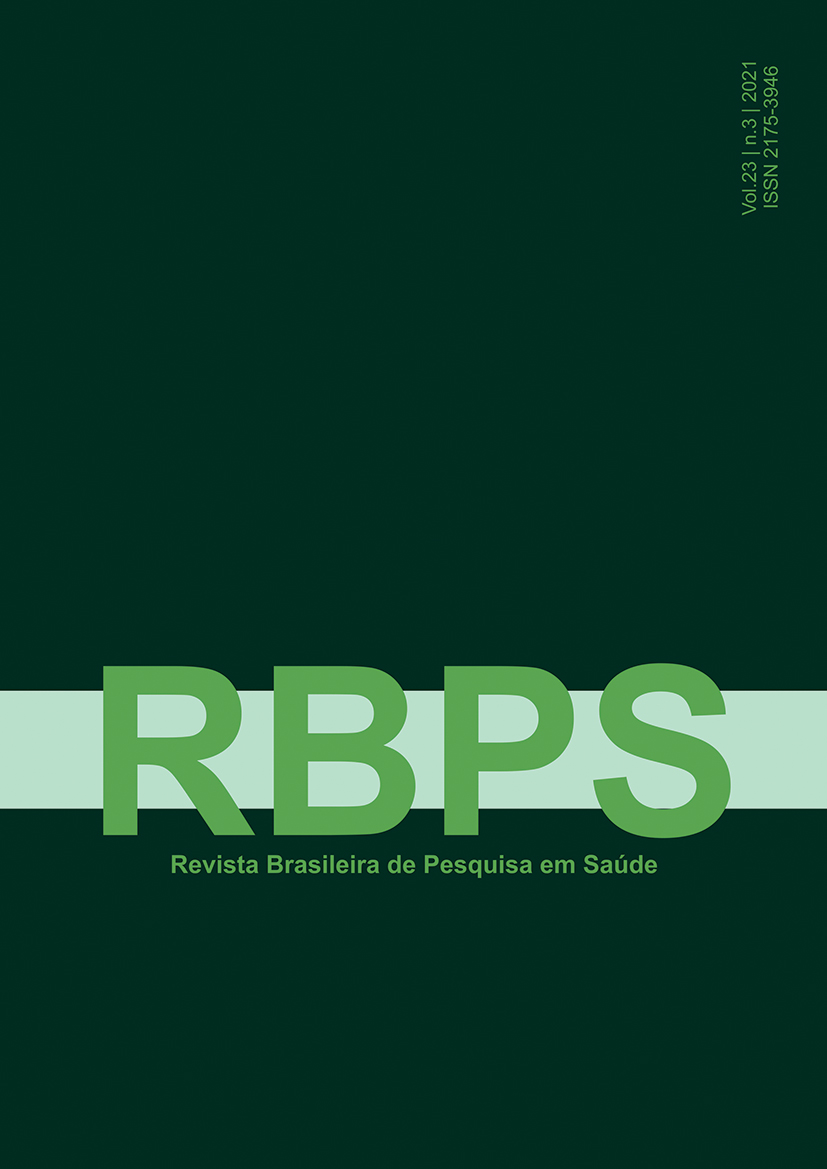Perception of the nursing in neonatal intensive care unit under the newborn’s dying process
DOI:
https://doi.org/10.47456/rbps.v23i3.33857Keywords:
Nurses, Intensive care neonatal, DeathAbstract
Introduction: An intensive care unit requires special care and the work of qualified nurses. Objectives: To know the experience of coping with nurses in the face of death and grief within a neonatal ICU and their coping strategies. Methods: This is a descriptive, qualitative study where the research subjects consisted of seven professionals from the nursing team who worked in a neonatal intensive care unit in a large hospital in the city of Piracicaba-SP. The data collection instrument was a semi-structured interview with a script of open questions, and the collected material was recorded and transcribed in full. Results: The grouping of similar Central Ideas resulted in seven Collective Subject Discourses that were grouped into three three categories: 1) difficulties in dealing with death; 2) the meaning of dignified death; and 3) coping strategies to experience death and grief. Conclusion: For most of the nurses interviewed, death inside the NICU generates a feeling of impotence and anguish. It is necessary for professionals working in the NICU to be specialists in this work environment, and for health institutions to offer psychological support so that their employees know how to deal with the team and family in the best possible way with this sad reality.
Downloads
References
Sousa MS, Vieira LN, Carvalho SB, Monte NL. Os cuidados de Enfermagem com os recém-nascidos na UTI. Rev. Saúde em Foco. 2016; 3(1): 94-106.
Reichert APS, Lins RNP, Collet N. Humanização do Cuidado da UTI Neonatal. Rev Eletr Enfer. 2007; 9(1): 200-213.
Rossetto M, P, Pinto EC, Silva LAA. Cuidados ao recém-nascido em terapia intensiva: tendências das publicações na Enfermagem. Vittalle. 2011; 23 (1): 45-56.
Pinho IC, Siqueira JCBA, Pinho LMO. As percepções do enfermeiro acerca da integralidade da assistência. Rev Eletr Enferm. 2006; 8 (1): 42–51.
Gaiva MAM; Scochi CGS. Processo de trabalho em saúde e enfermagem em UTI neonatal. Rev Lat Americ de Enf. 2004; 12(3):469-76.
Pereira VT, Oliveira MAN, Fontoura EG, Servo ML, Freitas KS, Portela PP, Gois JÁ. Sofrimento moral vivenciado pelo enfermeiro em unidade de terapia intensiva neonatal. Rev Braz. J. Hea. 2020; 3 (4): 7590-7602.
Roseiro CP, Paula KMP. Concepções de humanização de profissionais em Unidades de Terapia Intensiva Neonatal. Estudos Psicol. 2015;32(1):109-19.
Marques CDC, Veronez M, Higarashi IH. Significados atribuídos pela equipe de enfermagem em unidade de terapia intensiva pediátrica ao processo de morte e morrer. Rev Mineira Enferm. 2015; 17(4): 831-837.
Santos MH, Mochel EG, Rafael EV. Vivenciando a morte: experiência de profissionais de enfermagem no contexto da unidade de terapia intensiva neonatal. Rev Pesq Saúde. 2010; 11 (3): 9-15.
Lourenção ML, Troster EJ. Fim de vida em unidades de terapia intensiva pediátrica. Rev. Bioét. 2020; 28( 3 ): 537- 542.
Araujo SAN, Belém KF. O processo de morte na unidade de terapia intensiva neonatal. Rev ConScientia e Saúde. 2010; 9(2): 290-99.
Pope C, Mays N. Pesquisa qualitativa na atenção à saúde. 2ª edição. Porto Alegre: Artmed, 2005. 118 p.
Minayo MCS (Org.) Pesquisa social: teoria, método e criatividade. 22 ed. Rio de Janeiro: Vozes, 2003.
Bardin L. Análise de Conteúdo. São Paulo: Edições, v. 70, p. 279, 2011.
Rocha MCP, Carvalho MSM, Fossa AM, Rossato LM. Assistência humanizada na terapia intensiva neonatal: ações e limitações do enfermeiro. Rev Saude. 2015; 15 (4): 67-84.
Cardoso DH, Muniz RM, Schwartz E, Arrieira ICDO. Cuidados paliativos na assistência hospitalar: a vivência de uma equipe multiprofissional. Texto & Contexto Enferm. 2013; 22(4): 1134-41.
Scarton J, Poli G, Kolankiewicz ACB, Rosanelli CLSP, Scarton J, Poli AG. Enfermagem: a morte e o morrer em unidade de terapia intensiva pediátrica e neonatal. Rev enferm UFPE. 2013; 7(10):5929-37.
Almeida FA, Moraes SM, Cunha MLR. Cuidando do neonato que está morrendo e sua família: vivências do enfermeiro de terapia intensiva neonatal. Rev Esc Enferm USP. 2016; 50 (n.esp): 122-29.
Gazzola LPL, Leite HV, Gonçalves GM. 2020. Comunicando más notícias sobre malformações congênitas: reflexões bioéticas e jurídicas. Rev. Bioét. 2020; 28( 1 ): 38-46.
Santos JPR, Pedrosa MD, Carvalho ACM, Farias CB, Freitas EAC, et al. Cuidados paliativos em Neonatologia: Uma revisão narrativa. Rev Braz. J. Hea. 2020; 3 (5): 4589- 14601.
Ribeiro APS, Silva JSLG, Medeiros TC. A equipe de enfermagem e a morte do recém-nascido. Revista Pró- UniverSUS. 2020; 11 (1):129-135.
Lemos LFS, Cunha ACB. Morte na maternidade: como profissionais de saúde lidam com a perda. Rev Psicol em estudo. 2015; 20 (1): 13-22.
Rockembach JV, Casarin ST, Siqueira HCH Rockembach JV, Casarin ST, Siqueira HCH. Morte pediátrica no cotidiano de trabalho da enfermeira: sentimentos e estratégias de enfrentamento. Rev. Rene. 2010, 11(2):1-212.
Rocha DDD, Nascimento ÊCD, Raimundo LP, Damasceno AMB, Bondim HFFB. Sentimentos vivenciados pelos profissionais de Enfermagem diante de morte em unidade de terapia intensiva neonatal. Mental, 2017;11(21), 546-560.
Cunha MAP, Santos EPS, Ferreira TA, Baldoino LS, Costa MAS, Ribeiro AMN. Death in the intensive therapy unit: nursing. Rev Enferm UFPI. 2020; 9(1): 1-7.
Downloads
Published
How to Cite
Issue
Section
License
Copyright (c) 2022 Brazilian Journal of Health Research

This work is licensed under a Creative Commons Attribution-NonCommercial-NoDerivatives 4.0 International License.
Authors and reviewers must disclose any financial, professional, or personal conflicts of interest that could influence the results or interpretations of the work. This information will be treated confidentially and disclosed only as necessary to ensure transparency and impartiality in the publication process.
Copyright
RBPS adheres to the CC-BY-NC 4.0 license, meaning authors retain copyright of their work submitted to the journal.
- Originality Declaration: Authors must declare that their submission is original, has not been previously published, and is not under review elsewhere.
- Publication Rights: Upon submission, authors grant RBPS the exclusive right of first publication, subject to peer review.
- Additional Agreements: Authors may enter into non-exclusive agreements for the distribution of the RBPS-published version (e.g., in institutional repositories or as book chapters), provided the original authorship and publication by RBPS are acknowledged.
Authors are encouraged to share their work online (e.g., institutional repositories or personal websites) after initial publication in RBPS, with appropriate citation of authorship and original publication.
Under the CC-BY-NC 4.0 license, readers have the rights to:
- Share: Copy and redistribute the material in any medium or format.
- Adapt: Remix, transform, and build upon the material.
These rights cannot be revoked, provided the following terms are met:
- Attribution: Proper credit must be given, a link to the license provided, and any changes clearly indicated.
- Non-Commercial: The material cannot be used for commercial purposes.
- No Additional Restrictions: No legal or technological measures may be applied to restrict others from doing anything the license permits.

























